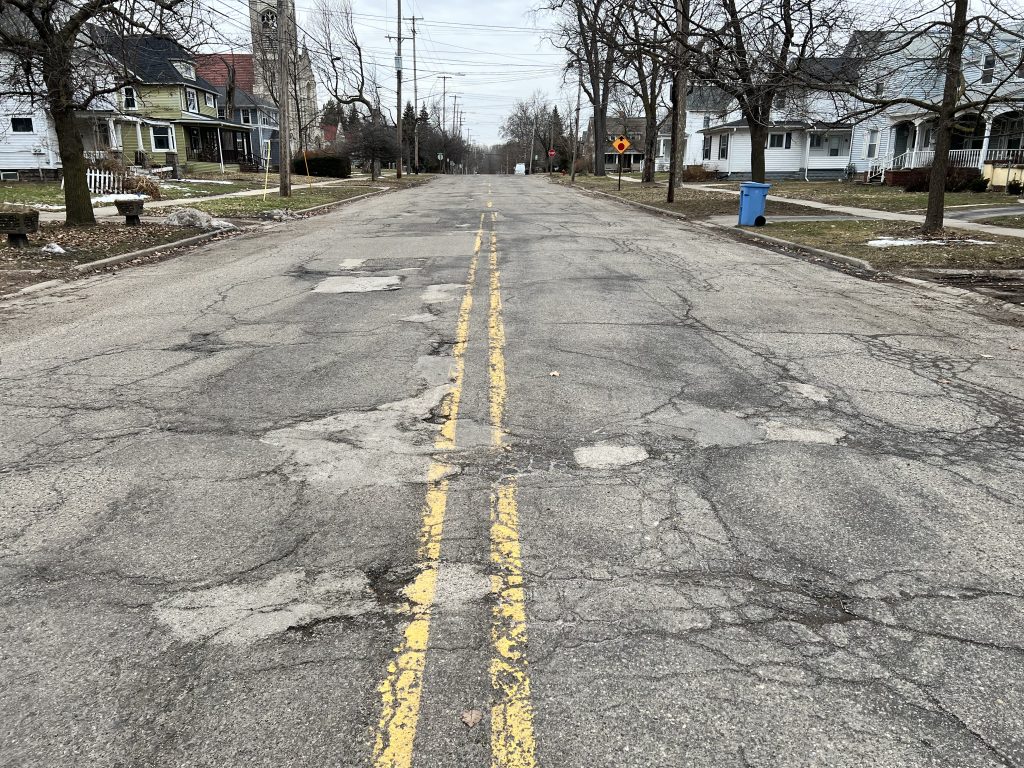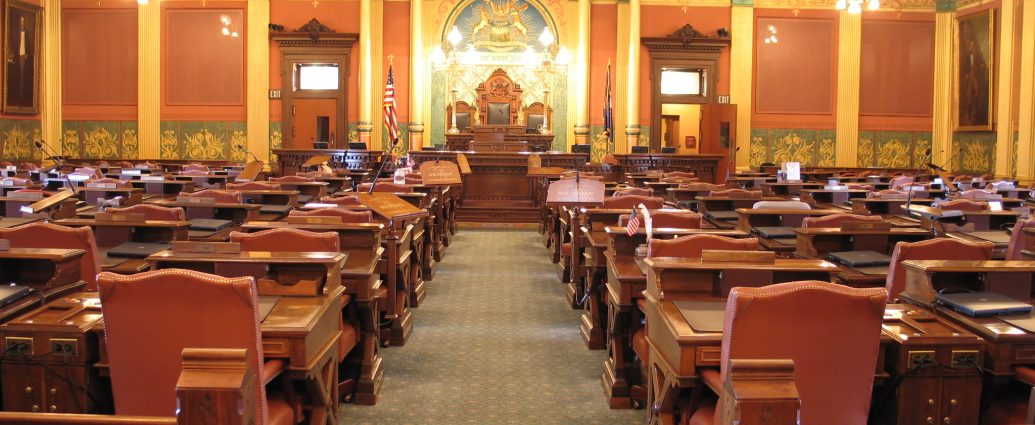by: John Clore | 3/19/2025 at 5:42 PM
LANSING, MI – House Republicans approved a $3.1 billion annual road funding package on Wednesday, advancing a nine-bill plan that aims to allocate more resources toward Michigan’s deteriorating infrastructure. However, the proposal faces strong opposition from Democrats who argue that it could lead to significant cuts in essential state programs. The legislation is expected to undergo changes before reaching Governor Gretchen Whitmer’s desk.
Governor Whitmer has consistently advocated for an alternative approach to road funding, emphasizing the need for new revenue sources. In February, she proposed a plan requiring additional revenue streams, arguing that sustainable funding solutions are necessary for long-term infrastructure improvements.

Key Elements of the Republican Plan
The Republican proposal seeks to ensure that all taxes Michigan drivers pay at the pump directly fund road maintenance. This would involve eliminating the existing 6% sales tax on motor fuels and replacing it with an equivalent fuel tax, maintaining overall costs for consumers. The plan includes increasing the motor fuel tax from 31 cents per gallon to 51 cents, with ongoing annual adjustments for inflation.
To compensate for the loss of sales tax revenue affecting school funding, the GOP plan redirects $755 million from the state’s general fund. However, Democrats have raised concerns about the broader fiscal impact, cautioning that this reallocation could negatively affect education, housing, and healthcare programs.
State Rep. Stephen Wooden (D-Grand Rapids) criticized the proposal, calling it a “shell game” that merely shifts money rather than solving the core funding issue. In contrast, Republicans argue that Michigan’s recent budget surpluses indicate that sufficient funds exist and need to be reprioritized.
“I am getting really tired of talking about the damn roads, so let’s actually fix them,” said State Rep. Jamie Thompson (R-Brownstown Township), underscoring Republican frustration over stalled infrastructure negotiations.
-

DOGE Travel mug with a handle
$25.00 Add to cart -

Skilled Labor Isn’t Cheap (Support The Trades)
$22.00 – $30.00 Select options This product has multiple variants. The options may be chosen on the product page -

Brotherhood (Support The Trades)
$15.50 – $24.00 Select options This product has multiple variants. The options may be chosen on the product page -

Unique D.O.G.E. Ceramic Mug – 11oz & 15oz
$7.68 Select options This product has multiple variants. The options may be chosen on the product page
Business and Corporate Tax Implications
A contentious aspect of the GOP plan includes an incentive for businesses to forgo legacy tax credits from a discontinued economic development program. The plan proposes raising tax rates on companies with outstanding credits, a move Governor Whitmer and business leaders have opposed.
“I know that a lot of our big companies and employers have made long-term decisions based on commitments from the state,” Whitmer said. “I think it would be a mistake to upend that.”
Additionally, the plan redirects corporate income tax revenue currently designated for housing and economic development projects. Over the next few years, up to $2.2 billion in corporate tax funds would be allocated to roads, with the majority benefiting local road agencies.
Business groups, including the Michigan Manufacturers Association and the Detroit Regional Chamber, have voiced concerns over these changes. Chamber Vice President Brad Williams warned that reducing corporate tax incentives could deter businesses from investing in Michigan, sending “the wrong signal to companies both here and abroad.”
Political Challenges and Next Steps
House Speaker Matt Hall (R-Richland Township) defended the legislation, stating, “If we prioritize roads above corporate giveaways, we can fix our roads without raising taxes.” Hall highlighted that this proposal marks the closest lawmakers have come to reaching a deal on road funding under Whitmer’s administration.
Whitmer’s previous road funding attempt in 2019 included a 45-cent gas tax hike, which was rejected by lawmakers. Instead, the State Transportation Commission later approved a $3.5 billion bond initiative to rebuild state highways and bridges—though local roads remained largely unfunded.
“If we don’t find a solution, our roads will get worse and more dangerous, leading to costly car repairs and delays,” Whitmer warned in a speech at the Detroit Auto Show earlier this year.
The Republican-led House and Democratic-controlled Senate now face the challenge of reconciling their competing road funding visions. While both parties acknowledge the need for approximately $3 billion annually, their approaches differ sharply. Whitmer’s plan proposes a mix of new revenue sources, including corporate tax increases and a new marijuana tax, alongside $500 million in unspecified budget cuts.
Senate Majority Leader Winnie Brinks (D-Grand Rapids) dismissed the GOP proposal as “nonsense,” stating that it asks Michigan residents to “pay more but get less.”
The House bills passed largely along party lines, with votes ranging from 61 to 65 in favor and 43 to 47 against. A handful of lawmakers from both parties crossed the aisle on select bills. The legislation now moves to the Senate, where Democrats are expected to push for significant modifications before any final deal is reached.
Featured Articles
DOGE on Michigan Wasteful Spending: LGBTQ, DEI, and Transgender Study Funds Could Fix the Roads Instead!
by: John Clore | 3/20/2025 at 9:11 AM LANSING, MI – After writing Shocking Waste: Federal Audit Uncovers Billions Wasted on Foreign Social Programs And seeing countless people on social media say, “We need DOGE in Michigan,” I decided to DOGE Michigan’s wasteful spending—here’s what I uncovered. Michigan’s state government
Advertisement
Investigative Reports
$3.5 Billion in Missing COVID Funds and You’re Crying Over HVAC? Nice Try, Detroit Free Press!
By John Clore | Investigative Journalist | 3/31/2025 at 5:58 PM Missing Billions, Not Just Millions: The Real COVID Aid Scandal in Michigan It’s no surprise that the Detroit Free Press is at it again — twisting the facts to push a narrative that fits a political agenda rather than


















